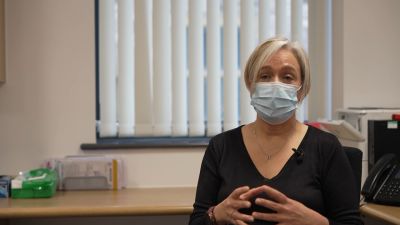Colwyn Bay doctor recalls driving sick baby to hospital when no ambulance was available

A doctor at a GP surgery has recalled the moment her and her colleagues had to resort to driving a baby to hospital themselves because they were unable to get an ambulance.
Dr Helen Alefounder, who works at West End Medical Centre in Colwyn Bay, said her surgery is dealing with more than 250 patients a day as they face a record demand for services.
She said they are often having to pick up the slack caused by overcrowded hospitals, and striking nurses and ambulance workers.
She told ITV News there are more than 18,500 patients on their books and they are "doing all they can."
"We in the community often pick up a lot of ill patients that come to us because they can't get an ambulance," Dr Alefounder explained.
"Or they don't want to go to hospital because the nurses are on strike or they don't want to go to hospital because they know how busy the hospitals are.
"For example the other week we had a really sick baby in here who we actually had to transport in one of our cars to the hospital because they were really sick and there was no other way of getting them there".
Dr Alefounder's surgery is part of Wales' biggest health board, Betsi Cadwaladr, which saw a record demand on services at the end of last year.
She said, "Demand is so big at the moment that we do need to ensure that the patients who do need to be seen today, are seen today and those who could maybe wait 24, 48, 72 hours are then put on the list for later in the week."
The Welsh Ambulance Service apologised for not being able to respond to the needs of a sick child.
Dr Brendan Lloyd, the Welsh Ambulance Service’s Executive Medical Director, said: “The pressure on health and care services – including on ambulance services and primary care – is well-documented, and we are very sorry that we were not able to provide an ambulance for a sick child in this case.
“We spent more than 32,000 hours waiting to hand patients over to hospital colleagues last month, and while crews are tied up at hospitals, they’re unable to get to other patients in the community.
“It means that some patients are waiting a very long time for us to arrive, and we would like to apologise to all those patients and their loved ones who have had a poor experience."
“We recognise that GP surgeries are not designed to provide emergency care, and that the current pressures within the NHS may on occasion put our primary care colleagues in a difficult position.
“We want to – and will – do better, and have a comprehensive action plan underway to improve the services we deliver but ultimately, it’ll take a system-wide effort to resolve a system-wide issue and we continue to work with Welsh Government and Local Health Board colleagues to implement lasting, meaningful improvement.
“We are grateful to partners for raising these concerns, and I would invite this GP to contact me directly to discuss further.”
Statistics from the British Medical Association saw more patients are being seen in GPs than before the Covid pandemic.
This is coming at a time when GP numbers are declining and surgeries are struggling to recruit and retain staff.
Dr Sara Bodey, a GP partner at Bryn Darland Surgery, Coedpoeth, and Chair of the North Wales Local Medical Committee of General Practitioners, said, "Many GP practices saw a threefold increase in the number of urgent same day requests from patients in December, but even before this, UK wide data suggested general practice was working at 20 per cent increased activity.
"It's demoralising to see comments from the public criticising GPs, because we're supporting more patients than ever before and colleagues are going above and beyond.
"Recent weeks have probably been the worst in my 19 years of working as a GP in terms of pressure and workload and the general practice workforce is beyond exhausted.
"We still love what we do - that's why we're still here and haven't left, but it is becoming harder to maintain this enthusiasm in the face of the unrelenting pressures."
The Colwyn Bay practice has a multi disciplinary team based on site which includes, GPs, nurse specialists, physiotherapists and a pharmacist.
Dr Alefounder admits that is not something all surgeries have but primary care needs to change.
"Things have to change and actually we can still provide that family feel, that continuity of care but we do it with other healthcare professionals."
Patient Karen Jones was at the surgery to see a physiotherapist.
She explained: “It’s been hard over the last few years but recently here the surgery’s gone through quite a significant change so I was able to contact them and get through which was good.
"I then had a triage call and then the lady suggested possibly a physio appointment would be better than a GP so that’s what I’m here for.
“I think a physio’s going to be able to help me. A GPs going to make a referral to a physio and then that would delay the process.
"Before it was very difficult to get appointments here . You had to phone and make your appointments at 10 o clock in the morning. Often you were still trying to get through and onto a holding list.”
It was one of the biggest news stories of our time - and it's still not over. So what did Boris Johnson know about Downing Street’s notorious parties? With fresh revelations from our Number 10 sources, in their own words, listen to the inside story...